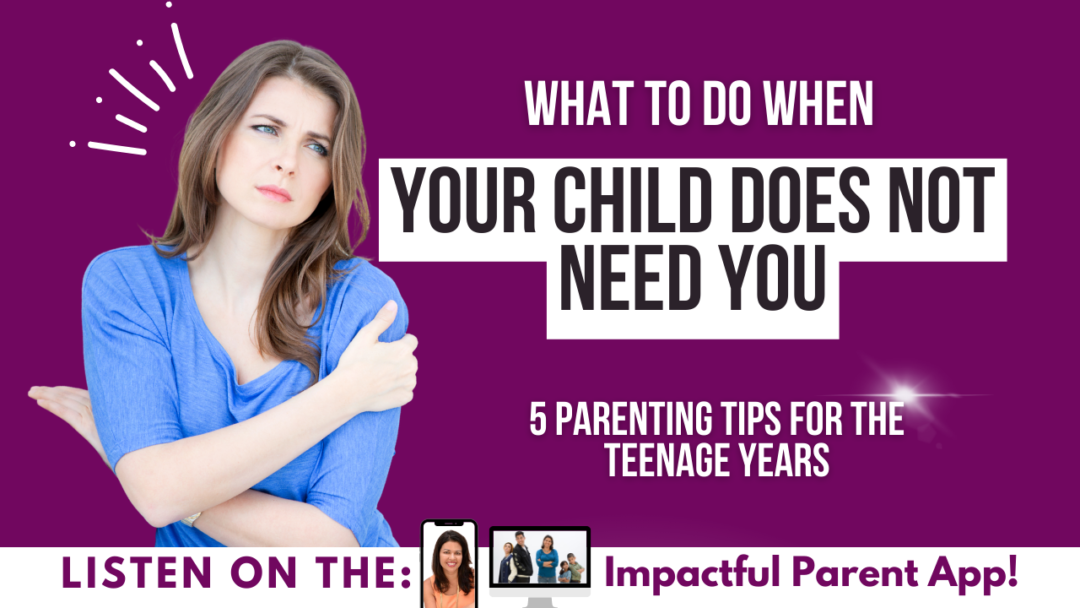When Your Child Doesn’t Need You Anymore: 5 Parenting Tips for the Teenage Years
You knew this day would come but it feels too soon! Letting go when your child no longer needs you is really difficult! BUT- you aren’t alone. This week The Impactful Parent gives 5 tips to parents for dealing with this tough new phase in parenting.
Click on the link below to listen to the podcast! 👇
LINKS MENTIONED IN THE RECORDING
https://theimpactfulparent.com/app Download the FREE Impactful Parent App! Available on Apple and Android App Stores. FREEBIES from episodes included!
Apple Store: https://theimpactfulparent.com/ios
Android Play Store: https://theimpactfulparent.com/android
https://theimpactfulparent.com for more FREE Resources and paid programs.
What Do You Think?
Rate, Review, & Subscribe!

“I love Kristina and all the FREE tips that she has to offer! Thank you for making my parenting journey better!” <– If that sounds like you, please consider rating and reviewing my show! This helps me support more people — just like you!!!
Rate with five stars, and select “Write a Review.” Then be sure to let me know what you loved most about the episode!
Also, if you haven’t done so already, subscribe to the podcast. I’m adding a bunch of bonus episodes to the feed and, if you’re not subscribed, there’s a good chance you’ll miss out. Subscribe now!
What to do next:
1. Get The Impactful Parent App! Everything you need in your parenting journey in one spot! Available on the Android Play Store and the Apple Store. Search Impactful Parent (direct links listed above under Links in Episode).
2. Follow The Impactful Parent on social media if you don’t already! Facebook, Instagram, LinkedIn, & Pinterest
4. Check out the official website of The Impactful Parent for FREE RESOURCES, parenting classes, mom’s groups, and so much more! Click here to check it out!
5. Discover how you can work with Kristina! Sign up for a FREE 30-minute discovery call! Click here to find a time that works best for you!
Bottom Line… I am here for YOU! Contact me at theimpactfulparent@gmail.com

TRANSCRIPT
When Your Child Doesn’t Need You Anymore: 5 Parenting Tips for the Teenage Years
“Mom, stop it! I got it,” says my son as he slaps my hand away because I am trying to help him straighten his collar and shirt.
I can’t help it. All my eyes see is a 6-year-old boy struggling to get dressed when I am standing before my 16-year-old son, who is taller than me and capable of dressing himself.
Fast forward 5 years, and I am waving goodbye to this same “little boy” going off to college. Still, I can only see a nervous child with an oversized backpack and an Iron Man lunchbox.
It doesn’t matter if your child is an independent 13-year-old or 17 years old and leaving the nest- letting go when you feel like your child doesn’t need you anymore is really tough. No, tough doesn’t describe it. It is heartbreaking for many parents.
Hello, my name is Kristina Campos. I am the founder of the Impactful Parent. Every week I give you parenting videos that can help you in your parenting journey. If you have a particular topic or parenting question about your school-aged child that you would like me to address, please submit it at theimpactfulparent@gmail.com or by messaging me on social media. All submissions are kept anonymous.
As parents, it’s natural to feel a mix of emotions when we realize that our children are growing up and becoming more independent. The teenage years, in particular, can be challenging as our children assert their autonomy and navigate the world independently. If you’re feeling like your child doesn’t need you anymore, here are 5 practical tips to help you navigate this new phase of parenting. Let’s get started!

When Your Child Doesn’t Need You Anymore
- Adjust your expectations but stay engaged.
It’s important to recognize that your child is undergoing significant emotional and cognitive development during the teenage years. They may start seeking independence and pushing boundaries, making you feel like they don’t need you as much. However, it’s crucial to stay engaged in their lives and be available for support when they do need you. Adjusting your expectations will help foster a healthy balance between letting go and staying connected.
How Do Parents Do This?
Remember that school-aged children need a different kind of parenting than younger children. The more they grow, our role shifts from guardian to coach. Work on changing your mindset! The older your child is, the more you need to let go of the authoritarian, boss, or dictator inside of you. Instead, imagine your child as a student or player, and you are their life coach. By doing this, your expectations will also shift. As with many good coaches, we train our kids in particular skill sets. We educate our children about choices. We role model adulting. We manage our children’s needs and support them in their goals. We expect them to make mistakes, but we help them learn from them and improve for the next game/match/or event.

When Your Child Doesn’t Need You Anymore
- Foster open communication and active listening.
Maintaining open lines of communication is crucial throughout the teenage years. Even if your child may not seek your advice as frequently, creating a safe space to share experiences and emotions will help keep that bond strong. Active listening plays a vital role in this process.
How Do Parents Do This?
Avoid jumping to conclusions or giving unsolicited advice. Ninety percent of the time, teenagers need a listening ear. That’s it. Yet, many parents ruin this bonding time with their teen by going into “fix it” mode or saying, “Well, when I was your age….” Teenagers don’t care about that. They see your experiences as unrelated because your experience happened over 20 years ago. Instead, be a compassionate sounding board and provide guidance when they ASK. When your child shares a problem or an achievement, actively listen without interrupting. Reflect on what you hear, and validate their feelings before offering advice. This will make them feel heard and understood.
Second, you can’t over react when they do something wrong. In fact, the less you react, the better. You need to be a calm, safe space for them to confide in. No one wants to confide in someone they know is going to scream at them, lecture them, or take away their phone. This leads to lying and hiding. Of course, staying calm is much easier said than done because typically teenage mistakes are very costly and frustrating, but the less you react the better. This doesn’t mean you aren’t holding them accountable! This just means you need to administer consequences calmly.

When Your Child Doesn’t Need You Anymore
- Encourage Their Autonomy and Independence
While it may be bittersweet to see your child become more self-sufficient, embracing their growth and encouraging their autonomy is essential for their overall development. It’s important to provide opportunities for them to make decisions and face the consequences of their choices. This will help build their confidence and give them a sense of responsibility. Teenagers crave autonomy and independence, so give it to them. It’s your job to prepare them for the real world, and the real world will hit them in only a few years. It’s better to expose them now to some of the truths and difficulties of life while still under your care and support than protecting them from all the bad stuff and letting them discover that bad stuff world when they are living alone at college or away.
How Do Parents Do This?
Encourage your teenager to take on new challenges, such as managing their finances or cooking some of their own meals. Allow your child to face the consequences of their actions when appropriate instead of saving them. Empower them to make decisions and learn from their experiences, guiding them when necessary. None of this is easy. Knowing your teen will get hurt, fail, or struggle and letting it happen because they didn’t take your advice is really difficult. Still, your teen needs that autonomy to learn for themselves.

When your child doesn’t need you anymore
- Find New Avenues to Connect and Bond
As your child becomes more independent, finding new ways to connect and maintain a strong bond is important. This is going to take intentional EFFORT. Too often, parents think that the bond between parent and child should be natural, but as your child gets older, it will take a lot of effort!
How Do Parents Do This?
Look for common interests or activities that you can enjoy together. This could be anything from taking a cooking class to hiking or attending a concert. If you can’t find a common interest, you may have to suck it up and be interested in something your child likes. Finding shared experiences can build new memories and deepen your connection.
Also, carve out at least 15 minutes daily to check in with your child and talk to them. I suggest doing this on a car ride or at the dinner table. Make it look effortless, but in reality- you will be doing things very intentionally.
- Invest in Self-Care and Personal Growth
As your child becomes more self-reliant, it’s an excellent time to focus on your own self-care and personal growth. Engage in activities that bring you joy, invest time in your hobbies, and explore new interests. Finally, you are at the stage in your parenting that your child doesn’t need you for every little thing anymore. Celebrate that and take advantage! Taking care of your own well-being will benefit you and ensure that you are available and present when your child needs you.
How Do Parents Do This?
Dedicate some time each week to engage in activities that nurture your personal growth, such as joining a book club, learning a new skill, or practicing mindfulness. Stop making yourself last on your priority list! Sure, it may have been necessary to give up some of the hobbies you used to love years ago, but now it’s time to find YOU again. Carve out even more time for yourself by teaching your child to be more self-sufficient, like cooking their own meals, teaching them to drive, or making them do their own laundry. Doing these benefits both of you!
Remember, as parents, our love and support will always be important to our children, even if they don’t express it the same way anymore. By adjusting our expectations, fostering open communication, encouraging independence, finding new ways to connect, and investing in our well-being, we can evolve our parenting and foster strong relationships with our growing teenagers.
If this information was valuable for you today, BECOME a more impactful parent by downloading The Impactful Parent App. The Impactful Parent app is FREE and full of episodes like this one to help you in your parenting journey. Investing in your family looks like learning the warning signs of certain behaviors so you can stop bad things before they start, discovering new parenting techniques to make your parenting more effective, and joining a community of like-minded parents who want to be the best parent they can for their child. All of this, plus so much more, can be found inside The Impactful Parent app, so download it today. You got nothing to lose with this free parenting resource. Go to theimpactfulparent.com and discover how to step up your parenting game and be a more impactful parent.
But until next time, you got this, parents. I am just here to help.
It takes a lot to run a family! Here are a few products I recommend.
Gabb Wireless: The BEST first phone for your child!
- No internet, no social media, and NO WORRIES! This phone has GPS tracking and other features that parents want to have peace of mind about their child having a phone. The Gabb Wireless phone has the sleek look of a smartphone that kids love without worry and high price. To find out more and order your phone (or watch) go to: gabbwireless.com/promo/IMPACTFULPARENT30

